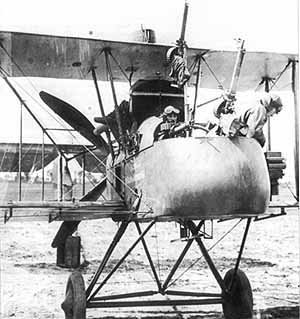|

Initially used for reconnaissance, the Farman Experimental 2
two-seater biplane ended the "Fokker Scourge" over the Somme.
Like the single-seat D.H.2, it was a "pusher" and items
floating about in the nacelle inevitably ended up being swept back into
the propeller, sometimes with disastrous results. Armed with two or
three Lewis guns and a camera, the observer sat far forward in the
nacelle, directly in front of the pilot. Vulnerable to attacks from
rear, the F.E.2 was frequently shot down. During the summer of 1916,
the Germans captured one of the first F.E.2d's when a British pilot
inadvertently landed his new aircraft at an enemy aerodrome. The
introduction of more advanced aircraft made the F.E.2 an ineffective
fighter and by 1917 it was primarily used for bombing missions.
Country: Great Britain
Manufacturer: Royal Aircraft Factory
Type: Fighter/Bomber
First Introduced: 1915
Number Built: About 1,000
Engine(s): Inline rotary, Beardmore 160 hp [120 kW]
Wing Span: 47 ft 9 in [14.56 m]
Length: 32 ft 3 in [9.83 m]
Height: 12 ft 7½ in [3.84 m]
Empty Weight: [935 kg]
Gross Weight: 3,037 lb [1,378 kg]
Max Speed: 91½ mph [150 km/h]
Ceiling: 11,000 ft [3,300 m]
Endurance: 2 hr 30 min
Crew: 2
Armament: 2 or 3 .303 Lewis machine guns |
